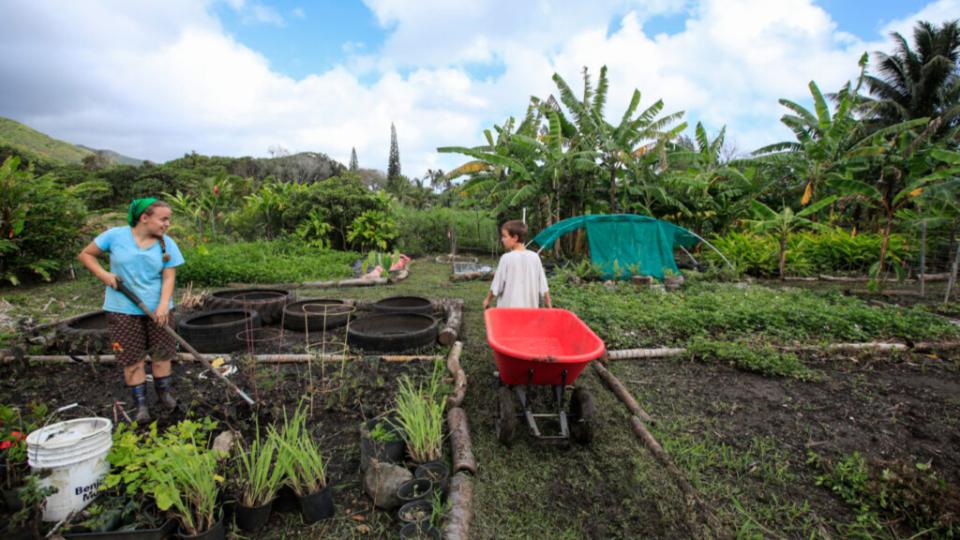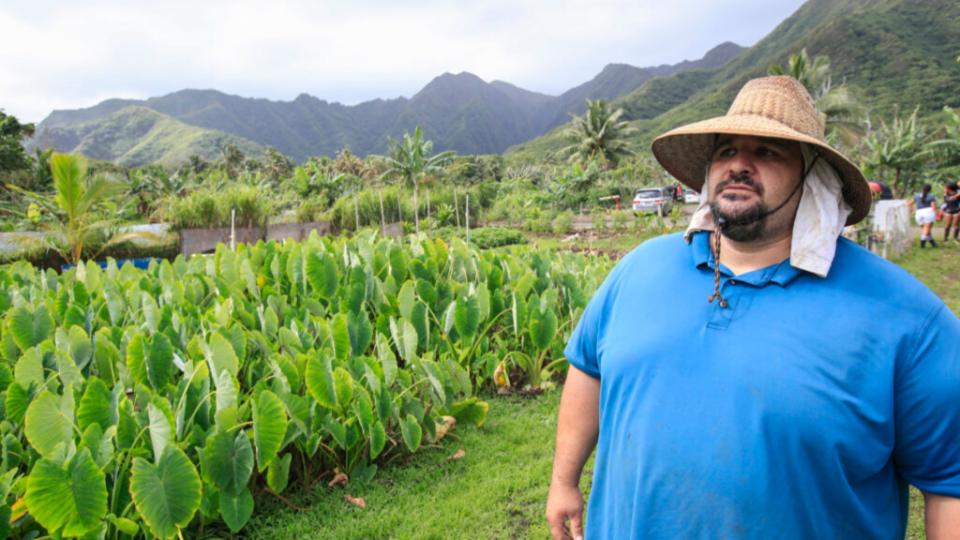- Church-Farm-1.jpg
- Church-Farm-3.jpg
- Church-Farm-8.jpg
- Church-Farm-2.jpg
- Church-Farm-4.jpg
- Church-Farm-5.jpg
- Church-Farm-6.jpg
- Church-Farm-7.jpg
| Temple Square is always beautiful in the springtime. Gardeners work to prepare the ground for General Conference. © 2012 Intellectual Reserve, Inc. All rights reserved. | 1 / 2 |
This story appears here courtesy of TheChurchNews.com. It is not for use by other media.
By Jason Swensen, Church News
An aerial photo of the Church’s Laie Hawaii Crops Farm could double as a postcard of an idyllic tropical Eden.
Well-ordered family garden plots, rows of banana plants and towering coconut trees border a stretch of blue Pacific coastline that appears endless.
But the view at ground level of the Laie Hawaii Crops Farm tells a different story.
While the Bible’s Eden once offered its abundance without effort, the crops here are harvested with sweat, muscle and cooperation. The reaping only occurs after a season of sowing.
But the scores of Latter-day Saint families/farmers here don’t begrudge the work. Together, they are raising taro, tapioca, sweet potatoes, breadfruit, guava and a variety of other traditional island crops. Joy accompanies their labors.
Owned and operated by The Church of Jesus Christ of Latter-day Saints for more than two decades, the 178-acre Laie Hawaii Crops Farm is yielding both temporal and spiritual relief at a time in the world usually associated with fear and worry.
“This farm is enabling us to produce food that can bless the lives of members and other folks that are in need,” said Bishop Saimone Tonga of the Hauula 6th (Tongan) Ward, Laie Hawaii Stake.
Temporal and Spiritual Relief During a Global Crisis
Located about five miles south of Laie on the island of Oahu, the Laie Hawaii Crops Farm has been invaluable during the ongoing COVID-19 pandemic.
Dips in Hawaii’s tourism industry, coupled with temporary operational interruptions at the nearby Polynesian Cultural Center and Brigham Young University–Hawaii, have left many local members out of work. Some are food vulnerable.
“The bishops in this area have been very busy in many wards because this situation has dragged on so long,” said Elder Mons Ellingson, a full-time missionary who manages the Church-owned farm with his wife, Sister Sally Ellingson. “The farm is a very important tool for bishops with regards to helping their members in need.”

Church-Farm-7.jpg
With the Koolau Mountain range in the background, Rodney Fonoimoana, middle, tends to taro with grandchildren Lokene Talaipa, 14, left, and Talaipa’s sister Trinity, 15, on his family’s farmland plot Saturday, March 20, 2021, on the Laie Hawaii Crops Farm in Hauula, Hawaii. Photo by Jamm Aquino, courtesy of Church News.All rights reserved.Demand for farm plots has steeply increased during the pandemic, he added. “In years past, the missionaries assigned to the farm have sometimes added around 10 new farm plots a year. Over the past nine months, we have added over 130.”
The Church farm provides relief in multiple ways. For one, the farming plots assigned to families enrich their diets with healthy, traditional native crops that are nutritionally superior to the highly-processed and often expensive foods stocked in grocery stores.
“Members of the [participating] stake presidencies have told me that, on average, families using the farm will save about $1,000 per month on their food bill,” said Wade Sperry, Church welfare farm specialist. “Many using the farms have several generations living in one household, so being able to save that much money is a real benefit to the people.”
A pair of pit ovens called imus located on the farm can also be reserved for family and friends to gather and cook traditional Hawaiian meals.
Assigned by local bishops, each family farm plot also teaches gospel principles such as self-reliance and consecration. Food that can’t be consumed by its growers is distributed to relatives, fellow ward members and neighbors. Much of the produce has been used to help feed homeless people in the community.
“Whatever produce our farmers don’t use, they share with others or give it to the bishops’ storehouse,” Elder Ellingson said.
Similati Vanisi, who served as a missionary on the farm, said people working on the Church property “are always willing to share with others and help each other. It is a blessing for many in many ways.”

Church-Farm-6.jpg
Sixteen-year-old Emma Hyde, left, and brother Seamus, 10, work their family’s farmland Saturday, March 20, 2021, on the Laie Hawaii Crops Farm in Hauula, Hawaii. Photo by Jamm Aquino, courtesy of Church News.All rights reserved.Farming can also be fun. Preparing a garden plot, caring for crops, harvesting fruit and, ultimately, eating and sharing the food are communal activities. Farmers of all ages—including youngsters and the elderly—enjoy being outdoors (it is Hawaii, after all) and being with one another, all while observing the safety protocols of the day.
“Every day, I go to the farm, and I see families and kids working together,” Bishop Tonga said. “They are plowing and planting, and they are seeing the fruits of their labors. They are producing food for their families. … Every plot, all the way to the hillside, has been planted with different types of food. It has been such a blessing.”
The farm is also a popular destination for full-time missionaries and other volunteers who simply want to serve. The farm averages more than 800 volunteer hours each month.
Fertile Hawaiian Soil, Holy Ground
The Laie Hawaii Crops Farm was established in the mid-1990s under the direction of beloved Church leaders such as Laie Hawaii Stake President Sione Feinga and Elder John H. Groberg, a General Authority Seventy who was presiding over the area at the time.
With the blessing of President Ezra Taft Benson, a site in the Hauula community was selected from several Church-owned properties. President Feinga, who died last year, was selected as the farm’s original agent.
The sprawling property is divided into farm plots of various sizes. Each plot is fenced and organized according to the specific needs of the farmer and his or her family. A pair of wells fitted with diesel pumps deliver water when needed to approximately 230 farms being utilized by over 310 families.
Managers such as Elder and Sister Ellingson commandeer the farm’s excavator and tractor to help clear land and prepare soil for planting. They also teach novices farming basics such as planting, watering and weed control.

Church-Farm-4.jpg
Johnny Feinga walks on his farmland Saturday, March 20, 2021, on the Laie Hawaii Crops Farm in Hauula, Hawaii. Photo by Jamm Aquino, courtesy of Church News.All rights reserved.For the hundreds of people laboring at Laie Hawaii Crops Farm, this is sacred ground.
“Just to be able to see the benefits of work, and to see the gratitude that people have for their opportunity to grow their own crops, has greatly increased our testimony and our understanding of self-reliance and the value of the law of the harvest,” Elder Ellingson said.
When the Church originally purchased the property decades ago, no one had ever uttered the word COVID-19. But the inspired, guiding foresight of Church welfare leaders such as President Harold B. Lee, President Thomas S. Monson and Elder Glen L. Rudd, a General Authority Seventy, continues to sustain life and live spirits.
“They are the ones that had the vision for these farms,” Sperry said.
The property value of the farmland has appreciated dramatically over the years. But its eternal worth cannot be measured in dollars. Each designated plot of rich Oahu soil allows families to feed themselves and others—even as they practice “true religion” and other eternal principles.
Copyright 2021 Deseret News Publishing Company